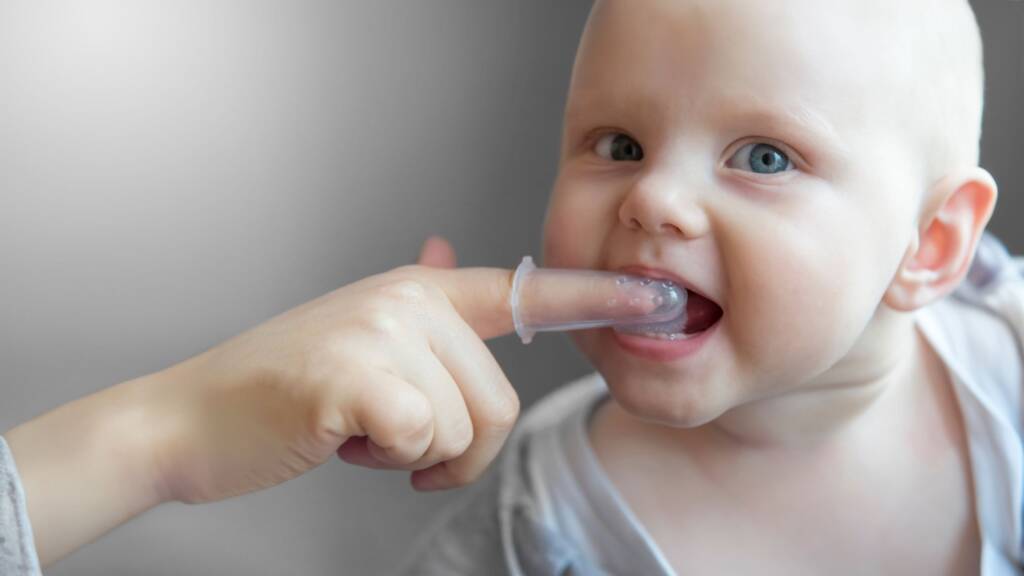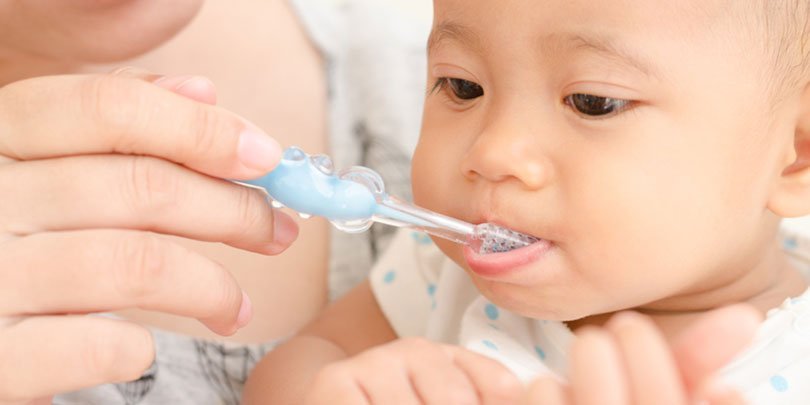Introduction to Newborn Oral Care
Oral care is a crucial aspect of a newborn’s overall health and well-being. Even though babies are born without teeth, establishing good oral hygiene practices from birth sets the foundation for a lifetime of healthy habits. This comprehensive guide aims to provide parents with all the information they need to care for their newborn’s oral health, from cleaning gums to managing teething pain and preventing oral health issues.
Understanding Newborn Oral Health
Development of Oral Structures in Newborns
Newborns are born with a fully developed oral cavity that includes the gums, tongue, and palate. Although teeth are not visible at birth, they begin to develop during the fetal stage and continue to grow beneath the gums until they start to emerge around six months of age.
Common Oral Issues in Newborns
Some common oral issues that can affect newborns include:
- Oral Thrush: A fungal infection that appears as white patches in the mouth.
- Teething Discomfort: Pain and irritability associated with emerging teeth.
- Lip and Tongue Tie: Conditions where the tissue connecting the lip or tongue to the mouth is too tight, affecting feeding and oral development.
Role of Oral Health in Overall Wellbeing
Oral health is integral to a baby’s overall health. Poor oral hygiene can lead to infections, pain, and difficulty feeding, which can impact a baby’s growth and development. Additionally, early oral care habits can help prevent future dental problems such as cavities and gum disease.

Establishing an Oral Care Routine
When to Start Oral Care
Oral care should begin from birth. Even without teeth, it is essential to clean a newborn’s gums daily to remove bacteria and prevent oral health issues.
Daily Oral Care Schedule
A simple oral care routine for newborns includes:
- Morning and Evening Cleaning: Clean the gums twice a day.
- After Feeding: Gently wipe the gums after feedings to remove milk residue.
Tools and Products Needed
The tools required for newborn oral care are minimal and include:
- Soft, Damp Cloth: For cleaning the gums.
- Baby Toothbrush: With soft bristles, to be introduced once teeth emerge.
- Water: No need for toothpaste initially, just water to clean the mouth.
Cleaning Your Newborn’s Gums
Importance of Gum Cleaning
Cleaning a newborn’s gums helps prevent the buildup of harmful bacteria that can lead to oral infections and ensure that the mouth remains clean and healthy.
Step-by-Step Guide to Cleaning Gums
- Wash Your Hands: Always start with clean hands.
- Prepare a Cloth: Use a soft, damp cloth or gauze.
- Position Your Baby: Hold your baby in a comfortable, secure position.
- Wipe the Gums: Gently wipe the gums, tongue, and inside of the cheeks.
- Repeat as Needed: Clean after feedings and at bedtime.
Frequency and Best Practices
- Twice Daily: Clean the gums in the morning and before bed.
- After Feedings: Wipe the gums to remove any residue.
- Gentle Technique: Be gentle to avoid irritation.
Teething and Oral Care
Signs and Symptoms of Teething
Teething can start as early as three months and includes symptoms such as:
- Drooling
- Chewing on objects
- Irritability
- Swollen gums
- Sleep disturbances
Oral Care During Teething
During teething, maintaining oral hygiene is crucial:
- Clean Gums: Continue cleaning the gums even if they are swollen.
- Massage: Gently massage the gums with a clean finger or a teething ring.
Soothing Techniques for Teething Pain
- Teething Rings: Offer a chilled (not frozen) teething ring.
- Cold Cloth: Let your baby chew on a cold, wet cloth.
- Teething Gel: Consult your pediatrician before using teething gels.
Choosing the Right Oral Care Products
Toothbrushes for Newborns
- Soft Bristles: Choose a toothbrush with soft bristles.
- Small Head: Ensure the toothbrush has a small head to fit comfortably in your baby’s mouth.
Toothpaste: To Use or Not to Use
- Water Only: Initially, use water only for cleaning gums.
- Fluoride Toothpaste: Introduce a tiny smear of fluoride toothpaste once the first tooth appears, typically around the age of six months.
Safe and Effective Oral Care Products
Look for products that are:
- Non-toxic
- BPA-free
- Specifically designed for infants
Preventing Oral Health Issues
Common Oral Health Problems in Newborns
- Oral Thrush: White patches caused by a yeast infection.
- Milk Residue: Can lead to bacterial growth if not cleaned.
- Teething Issues: Pain and discomfort from emerging teeth.
Preventive Measures for Oral Health
- Regular Cleaning: Clean gums daily.
- Avoid Sugary Foods: Limit sugary substances that can promote bacterial growth.
- Regular Checkups: Schedule early dental visits.
Importance of Early Dental Visits
- First Visit: Schedule the first dental visit by the baby’s first birthday.
- Monitoring: Regular checkups help monitor oral development and prevent issues.
Breastfeeding and Bottle-Feeding Practices
Impact on Oral Health
Both breastfeeding and bottle-feeding can impact oral health:
- Breastfeeding: Generally beneficial but can still leave residue on gums.
- Bottle-Feeding: Risk of bottle mouth decay if sugary liquids are used.
Proper Feeding Techniques
- Breastfeeding: Ensure proper latch and positioning.
- Bottle-Feeding: Hold the bottle at an angle to prevent milk pooling in the mouth.
Cleaning After Feeding
- Wipe Gums: Wipe the gums with a damp cloth after each feeding.
- Avoid Bedtime Bottles: Do not put the baby to bed with a bottle, as it can cause decay.
Pacifiers and Oral Health
Pros and Cons of Pacifier Use
- Pros: Satisfies sucking reflex, soothing, reduces SIDS risk.
- Cons: Can cause dental issues if used long-term, potential for ear infections.
Choosing the Right Pacifier
- Orthodontic Design: Choose an orthodontic pacifier to promote healthy oral development.
- Safety: Ensure the pacifier is BPA-free and meets safety standards.
Cleaning and Maintenance
- Regular Cleaning: Sterilize pacifiers regularly.
- Inspect for Wear: Check for signs of wear and replace as needed.
Thumb Sucking and Oral Health
Effects of Thumb Sucking on Oral Development
Prolonged thumb sucking can lead to:
- Misaligned Teeth: Can cause teeth to grow crooked.
- Bite Problems: May affect the roof of the mouth and bite.
Strategies to Discourage Thumb Sucking
- Positive Reinforcement: Praise your baby when they do not suck their thumb.
- Distraction: Provide other forms of comfort, like a teething ring.
- Consistency: Be consistent in discouraging the habit.
Alternatives to Thumb Sucking
- Pacifiers: Can be easier to control and wean off.
- Comfort Objects: Use a favorite blanket or toy for comfort.
Signs of Oral Health Problems
Early Signs of Oral Health Issues
Look for signs such as:
- White Patches: Could indicate thrush.
- Swollen Gums: May suggest infection or teething.
- Discomfort While Feeding: Could be a sign of oral pain.
When to Consult a Pediatric Dentist
- Persistent Issues: If problems persist despite home care.
- Injury: If there is an oral injury or unusual symptoms.
- First Tooth: Schedule a visit when the first tooth emerges.
Home Remedies and Professional Treatments
- Cold Compresses: For teething pain.
- Pediatric Consultation: For any persistent or severe issues.
- Medication: As prescribed by a pediatric dentist for infections.
Establishing a Dental Home
Importance of a Dental Home
Having a dental home ensures:
- Continuity of Care: Regular monitoring and timely interventions.
- Comfort and Familiarity: Helps the child feel comfortable with dental visits.
Choosing a Pediatric Dentist
- Experience: Look for a dentist specializing in pediatric care.
- Reputation: Check reviews and ask for recommendations.
- Approach: Ensure they use a gentle, child-friendly approach.
First Dental Visit: What to Expect
- Examination: Thorough oral examination.
- Guidance: Advice on oral care, teething, and diet.
- Comfort: Making the visit enjoyable and stress-free for the baby.
Oral Care for Premature Babies
Special Considerations for Premature Infants
Premature infants may have specific needs:
- Delayed Development: Oral structures may develop more slowly.
- Feeding Issues: Difficulty in feeding can impact oral health.
Tailoring Oral Care to Premature Babies
- Gentle Care: Use extra gentle techniques and products.
- Frequent Monitoring: More frequent checkups to monitor development.
Monitoring Oral Health in Premature Infants
- Regular Checkups: Frequent dental visits to monitor progress.
- Parental Vigilance: Parents should closely monitor for any signs of issues.
Impact of Diet on Oral Health
Nutrition and Oral Health
A balanced diet is crucial for oral health:
- Calcium and Vitamin D: Essential for strong teeth and bones.
- Avoid Sugars: Reduce sugar intake to prevent decay.
Foods to Avoid
- Sugary Snacks: Can lead to decay.
- Sticky Foods: Can cling to gums and promote bacterial growth.
Oral Care Tips Related to Diet
- Water: Give water after meals to rinse the mouth.
- Healthy Snacks: Offer fruits and vegetables instead of sugary snacks.
Oral Health Myths and Facts
Debunking Common Myths
- Myth: Baby teeth don’t need care.
- Fact: Baby teeth are crucial for overall health and development.
Evidence-Based Facts
- Fact: Early oral care prevents future dental issues.
- Fact: Good oral hygiene starts from birth.
Understanding Misconceptions
- Misconception: Only sugary foods cause decay.
- Reality: All carbohydrates can contribute to decay if not cleaned properly.

Tips for Parents and Caregivers
Involving Parents in Oral Care
- Education: Educate parents on the importance of early oral care.
- Routine: Encourage them to establish a consistent oral care routine.
Educating Caregivers on Best Practices
- Training: Provide training on proper techniques.
- Guidelines: Offer clear guidelines for oral care practices.
Creating a Supportive Environment
- Resources: Provide resources and support for parents and caregivers.
- Encouragement: Encourage regular dental checkups and proper care.
Oral Care Milestones and Development
Oral Development Stages
- Birth to 6 Months: Gum care and early oral development.
- 6 to 12 Months: Emergence of first teeth and introduction of brushing.
Milestones to Watch For
- First Tooth: Celebrate and start using a baby toothbrush.
- Teething: Monitor for signs of teething and manage symptoms.
Adapting Oral Care as Your Baby Grows
- Introduce Toothpaste: Use fluoride toothpaste as teeth emerge.
- Encourage Brushing: Teach and encourage brushing habits.
Handling Oral Injuries and Emergencies
Common Oral Injuries in Newborns
- Falls: Common as babies begin to move.
- Object Injuries: From chewing on hard objects.
Immediate Steps to Take
- Calm the Baby: Soothe and comfort the baby.
- Inspect the Injury: Check for any visible damage.
- Apply Cold Compress: Reduce swelling and pain.
When to Seek Professional Help
- Severe Injuries: If there is significant bleeding or a tooth is damaged.
- Persistent Pain: If pain or swelling does not subside.
Using Fluoride for Oral Health
Benefits and Risks of Fluoride
- Benefits: Strengthens enamel and prevents decay.
- Risks: Overuse can lead to fluorosis.
Safe Fluoride Practices
- Age-Appropriate Use: Use a tiny smear of fluoride toothpaste from six months.
- Supervision: Ensure proper brushing to avoid swallowing toothpaste.
Alternatives to Fluoride
- Fluoride-Free Toothpaste: Available for parents who prefer non-fluoride options.
- Dietary Sources: Ensure adequate dietary intake of fluoride.
Frequently Asked Questions about Newborn Oral Care
Common Concerns Addressed
- When to Start Brushing? Begin as soon as the first tooth appears.
- Is Fluoride Safe? Yes, in appropriate amounts for infants.
Expert Answers and Advice
- Frequency of Cleaning? Clean gums twice daily and after feedings.
- Pacifier Use? Safe if used correctly and cleaned regularly.
Additional Resources for Parents
- Books: “Caring for Your Baby and Young Child” by the American Academy of Pediatrics.
- Websites: American Dental Association, HealthyChildren.org.
- Classes: Local parenting classes on infant care and oral health.










